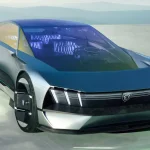Has Dennis Villeneuve dune it again? Mostly.
From apparently unadaptable cerebral sci-fi (Arrival) to against-all-odds superior sequels (Blade Runner 2049) via redefining how stressful traffic jams can be (Sicario), Dennis Villeneuve has proven time and time again he can deliver on the seemingly impossible.
Adapting Frank Herbert’s famously sprawling (some might say tortuously impenetrable) epic sci-fi novel “Dune” may have been his most ambitious undertaking – especially when considering the space saga previously defeated Alejandro Jodorowsky and made David Lynch label his 1984 effort “a total failure”.
His first instalment in 2021 was yet another triumph, a bombastic yet uncluttered epic that streamlined Herbert’s 1965 colossus without betraying the dense mythology at its sandy heart. It was billed as Dune: Part One, with no greenlit sequel when it premiered. Thankfully, the film succeeded both critically and commercially, leading to this much anticipated continuation… Leaving our favourite Canadian director facing the impossible once more – improving on his saga opener.
Dune: Part Two opens where we left off. We’re still in 10191, and cosmic Game of Thrones is still going strong. Indeed, feudal society remains divided by conflict over the exclusive control of Spice, a granulated commodity that has untold mental-enhancing benefits and is key to interstellar travel.
After the slaying of the House of Atreides by the Harkonnen meanies led by the Baron (Stellan Skarsgård), an act machinated by Emperor Shaddam IV (a disappointingly bland Christopher Walken), Paul Atreides (Timothée Chalamet) and his pregnant mother Lady Jessica (Rebecca Ferguson) are taking refuge with the Fremen – the desert folk on Arrakis who wield “Desert Power”.
A faction of Fremen, led by Stilgar (Javier Bardem), believes that Paul is the ‘Lisan al-Gaib’, the promised prophet that will liberate his people. The other faction, to which Chani (Zendaya) belongs to, isn’t too keen on prophecies and would rather focus on the prospect of a fairer, more egalitarian, and greener society.
So, false prophet or desert messiah? Does it matter if both roads lead Paul to his desired revenge? And more importantly, how is he going to balance canoodling with Chani whilst dealing with these Fremen divisions, as well as visions of an impending “holy war”, the Baron’s psychotic nephew Feyd-Rautha (Austin Butler), and the scheming designs of the meddling religious sisterhood, the Bene Gesserit?
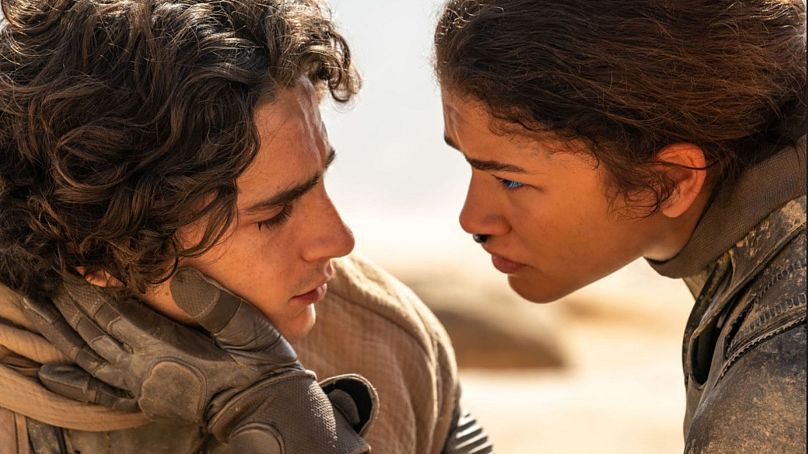
As you can tell, both Paul and Dennis Villeneuve have a lot of ground to cover and plenty of worms to fry – uh, ride. Paul is something of a reluctant saviour, unwilling to succumb to the fate that awaits him, while the director needs to spin all these narrative plates to deliver the goods teased to perfection in Part One.
The good news is that Villeneuve succeeds in combining jaw-dropping visuals with Shakespearian intrigue, chockablock full of morally complex themes dealing with fundamentalism, theocratic authoritarianism, fate, and the liberating / enslaving duality of prophecy. Few filmmakers out there could tackle storytelling of this epic scale while doing justice to both the thematic heft of the source material and the dazzling visual bombast a tale of this magnitude cries out for.
Throughout, much like the first instalment, Villeneuve’s vision is not only buttressed but elevated by the richly immersive cinematography by Greig Fraser, which is a true sight to behold. Add top-notch set design from Zsuzsanna Sipos, Shane Vieau and their art department team, excellent VFX, and some stellar work from costume designer Jacqueline West, and you’ve got yourself one of the best looking blockbusters you’ll see all year.
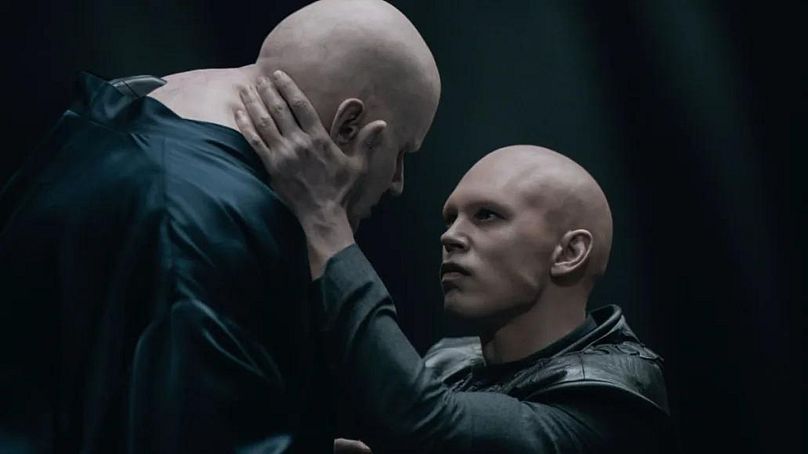
On the performance front, everyone is on great form. Well, almost everyone.
Saga newbies Christopher Walken and Florence Pugh, playing the Emperor’s politically savvy daughter Princess Irulan, get very little to do. Neither does Léa Seydoux as the seductive Bene Gesserit member Lady Margot Fenring. It’s hardly their fault, but such acting calibre deserved more screen time.
One who does manage to leave a mark (in more ways than one) is Austin Butler, who emerges as this chapter’s MVP. Granted, he’s no Sting in a jockstrap, but he gives the blade-licking Feyd-Rautha a ruthless and deliciously unpredictable edge, wielding a palpable sense of dread like the Emperor should have.
As for the returning players, Chalamet and Zendaya deliver the goods, and Bardem is blessed with more to do this time around – even adding some humour to some dark and tense proceedings. The true standout here though is Rebecca Ferguson, who fully embraces her character arc – which is equally as fascinating as her onscreen son’s. She transforms from loving mother into ruthless tactician, embracing her new role of Reverend Mother and becoming borderline despicable as a manipulative Oedipal nightmare that operates to guide her son towards his fate. She is still his protector, but has come to terms with the fate of all things. As for the way she whispers to her foetus, it could have been ripe for parody but Ferguson makes it utterly chilling. Again, far more chilling than anything the Emperor does.
To be clear – Christopher Walken is loved and admired. He’s just miscast.
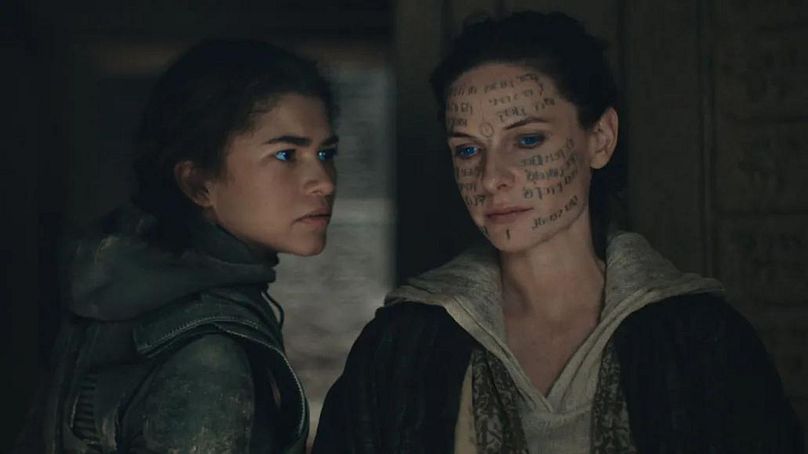
And now comes the sandblasted rub, which prevents this second chapter from being its predecessor’s equal.
While Dune: Part Two is bigger and more muscular, it is not better. It’s epic filmmaking at its most ambitious, and a terrific continuation of the first instalment – one which many unwisely dismissed as a place-setter. That said, there are sizeable issues when it comes to pace and payoff.
Everything works to perfection in the first two acts, but the finale doesn’t quite land, with some scenes feeling oddly curtailed in the last act – especially the dashed battle sequences. The build-up is there, and a sizeable chunk of runtime is spent treating the characters as fully rounded beings – as opposed to props positioned in a cool-looking shot. No complaints there. However, the ending feels rushed, leading to the frustrating sensation that thrills were sacrificed in a crescendo that fizzles out.
It is already impressive that with a runtime of 166 minutes, Dune: Part Two never truly drags; so why not take an extra 20 minutes to make the compound attack which leads to the final showdown between Paul and Feyd-Rautha something that felt earned and not just… there?
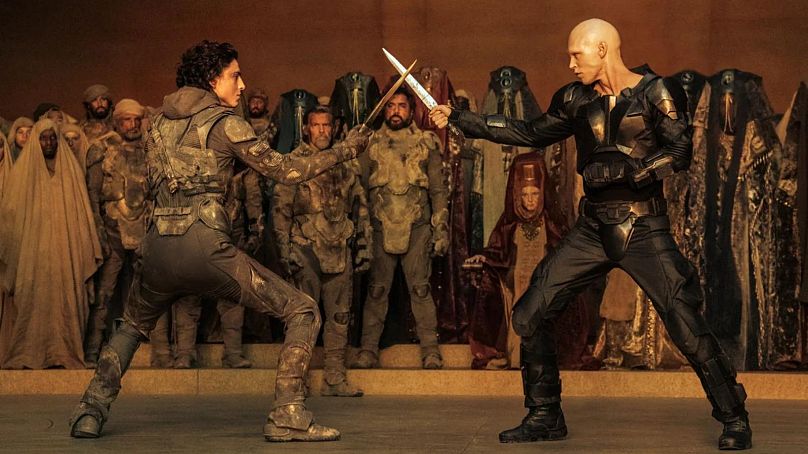
Then there’s the lack of closure.
Villeneuve’s Dune saga was never announced as a multi-episode epic from the get-go. It’s been drip-fed, and this sequel gives a payoff that doesn’t tease a future third episode, but rather cries out for one.
Not that the ending is terrible by any means – it shrewdly deviates from the source material and sets up Chani as a dissenter despite her love, re-emphasizing the dangers of self-fulfilling prophesies and the perils of blind faith. This is a thematic strand that was near and dear to Frank Herbert, as the books are centred on direct parallels with religious crusades and exploring the consequences of the choices we make. The changing shift in hero perspective is promising. Imagine if your paladin turns out to become Darth Vader.
Just think what could have been if that culmination had felt less hurried and more cathartic. Then and only then could comparisons with The Empire Strikes Back or Lord of the Rings: The Two Towers have felt legitimate.
Considering the near six-hour narrative in total so far, it does remain impressive to be left wanting more. Even so, had structural crinkles been ironed out and audiences been told in advance that this was the middle chapter, maybe some pacing woes would have appeared less glaring, and resolution niggles seemed less troublesome.
Should the mooted third part, which would cover the novel “Dune Messiah”, be greenlit, then audiences will be treated to a proper trilogy-closer, and to a complete vision most likely worthy of masterpiece status as a three-arc unit. However, if Villeneuve’s Dune ends up as a two-parter (as unlikely as it seems), then this ending may leave many feeling in the churlish mood to grumble.
Not everyone will, though. Duneheads will be thrilled by Dune: Part Two, and bellyaching aside, it’s worth stressing that nothing detracts from this being rousing and stylish science-fiction told in a mature manner. It doesn’t treat its audience like brainless drones, and its achievements cannot be denied – especially not with that retina-melting cinematography. And maybe because Villeneuve did such an incredible job of Part One, it’s possible that Part Two doesn’t feel quite as groundbreaking by comparison.
There’s also the fact that the director has accustomed viewers throughout his career to expect perfection; therefore, some minor flaws may seem more glaring than they actually are.
That being said, few directors operate at this scale of filmmaking. Villeneuve once again shows with the grandiose and thoughtful spectacle of Dune: Part Two that audiences need not content themselves with the insultingly shallow dross being churned out by creatively barren studios simply looking to maintain IPs or desperately clinging onto relevance. See: anything from this year’s Madame Web to the conveyor belt of recent Marvel films that reveal the MCU have well and truly lost the plot. In that sense, this sequel bucks the current Hollywood blockbuster trend – and that’s only cause for celebration.
Exhilarated or ever-so-slightly let down, Dune: Part Two does show that audiences shouldn’t have to settle for less. It also proves, once again, that no one specialises in pushing the boundaries of what is considered impossible on the big screen quite like Dennis Villeneuve.
Dune: Messiah next though, right? Right??
By David Mouriquand




